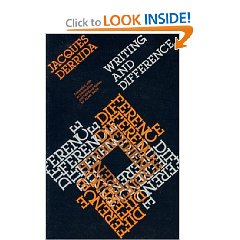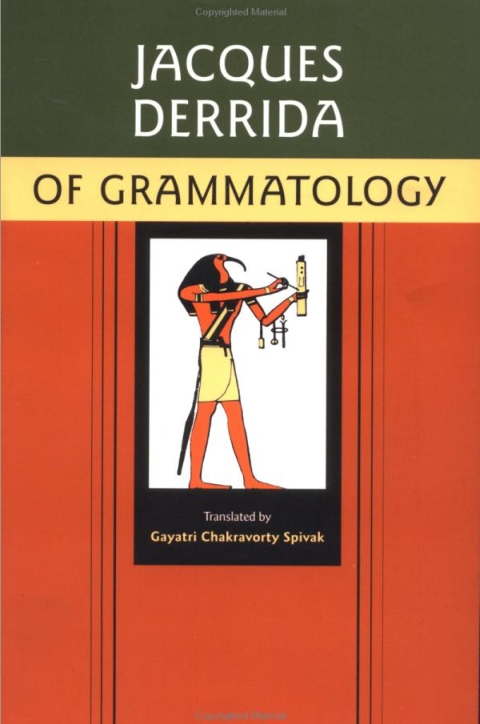Derrida, Dickson-Carr and the Blackness of Deconstruction
I knew about Jacques Derrida before I knew about Jacques Derrida. When Dr. Margo Natalie Crawford and I thought we were young, intellectual friends, she would tell me jokes about how the superficial, fad-like version of deconstructionism swept through her Yale peers like wildfire. It seemed like every campus conversation required the punctuation, “Let’s deconstruct that.”
My other homie, Dr. Darryl Dickson-Carr, sets the scene adroitly:
Deconstruction was a trend, but it actually hit its peak in terms of influence and popularity almost thirty years ago. Of course, one can argue that it receives periodic revivals whenever a new class of graduate students takes an initial theory proseminar, but that’s not quite the same.
As for me, I recall first being introduced to deconstruction the winter or spring of my senior year at UCSB, when I took an “Introduction to Literary Theory and Criticism” course. I admit to being taken in completely by Jacques Derrida’s “Structure, Sign, and Play in the Discourse of the Human Sciences,” due primarily to Derrida’s assertion that “the center is not the center” with regard to Western epistemology. It helped dislodge me from the Eurocentrism at the heart of my education, as had reading Malcolm X’s Autobiography some nine months earlier. I started questioning the ability of most of the books I read from that point to make meaning. I saw play and punning in their language. I was impossible (or is that “‘I’ was impos[s][i/a]ble”?).
I continued to find resonances in deconstructive theory for a couple of years, at least, until I realized what Ishmael Reed and others had said: people of the African Diaspora have been showing for centuries how the West deconstructs itself. The bloom was off the rose; the (nonexistent) center had no center.
I write none of this to indicate that deconstruction is useless, or that one cannot find value in it. You cannot expect to make it through any advanced degree program in the humanities without working knowledge of deconstruction and post-structuralist theory, especially if you refute or reject it, as some do. I simply found it more productive to engage in a historicist approach.
 When you struggle with my shabby word play in this journal babbling about exploring African intellect, it would have never occurred to me without the help of the relatively superficial film, Derrida, that some Jewish dude from Algeria (which is in Africa) was a living, breathing, influential, poetic example of what I call an ‘African revolt’ against European intellectual and technical assumptions about what is universal and what is natural. Derrida himself and 10,000 of his followers would never use my words to describe his journey through “philosophy” so it helps to write them down here for future reference. (In fact, Derrida is easily and deservedly grouped in with a French ‘wave’ of thinkers as dramatized and documented in French Theory: How Foucault, Derrida, Deleuze, & Co. Transformed the Intellectual Life of the United States.)
When you struggle with my shabby word play in this journal babbling about exploring African intellect, it would have never occurred to me without the help of the relatively superficial film, Derrida, that some Jewish dude from Algeria (which is in Africa) was a living, breathing, influential, poetic example of what I call an ‘African revolt’ against European intellectual and technical assumptions about what is universal and what is natural. Derrida himself and 10,000 of his followers would never use my words to describe his journey through “philosophy” so it helps to write them down here for future reference. (In fact, Derrida is easily and deservedly grouped in with a French ‘wave’ of thinkers as dramatized and documented in French Theory: How Foucault, Derrida, Deleuze, & Co. Transformed the Intellectual Life of the United States.)
Well… actually, I could be wrong about this. Maybe Derrida knew that some of his dance moves are of African origin because of the choice of imagery for this book cover:
Maybe not…
Through a serious study of Derrida, students have the opportunity to discover that their intellect has an ethnicity—and, regardless of your lovely complexion, that ethnicity is likely European. These students who may feel “uncomfortable” with my pro-Africa “rhetoric” can still get somewhere near I am coming from when, “Derrida takes issue with the way in which much of metaphysical thought is founded on dynamic oppositions of good and evil, interior and exterior…”
 My poetic vision about these Western “dynamic oppositions” borrows heavily from the book of Genesis and the “Knowledge of Good and Evil”—this can sound literally crazy to many properly assimilated chocolate church folk. So when you think my super-Black bag is full of shit (not collected by sacred beetles), I can now refer your hyper-modernized monkey ass to Derrida. Since I dislike intensely being called crazy—especially by women like, say, Dr. Margo Natalie Crawford, I am quite pleased and relieved that a relatively “acceptable” character is available to self-described “normal” people.
My poetic vision about these Western “dynamic oppositions” borrows heavily from the book of Genesis and the “Knowledge of Good and Evil”—this can sound literally crazy to many properly assimilated chocolate church folk. So when you think my super-Black bag is full of shit (not collected by sacred beetles), I can now refer your hyper-modernized monkey ass to Derrida. Since I dislike intensely being called crazy—especially by women like, say, Dr. Margo Natalie Crawford, I am quite pleased and relieved that a relatively “acceptable” character is available to self-described “normal” people.
A note for serious students of deconstruction: My use the phrase “Blackness of Deconstruction” in the title of this entry can be problematic because “Blackness” is a unit of dual opposition. Blackness requires whiteness—and deconstruction requires the dismantling of oppositional structures like “Black” and “white.” There is opposure and composure… my preference is for eternal African composure instead of temporal Black opposition so please regard my usage here as transitional, communicative and I daresay instructional.

